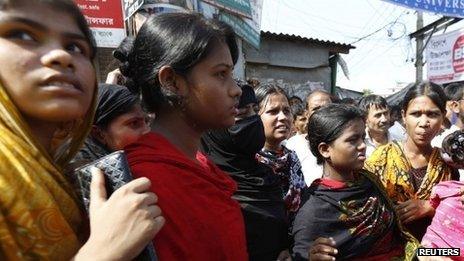Bangladesh garment plants to get factory safety cash
- Published

The garment sector is one of the most important components of the Bangladeshi economy
Bangladesh and the International Labour Organisation have agreed to launch a $24m (£15m) initiative to improve the conditions of garment workers.
The move comes almost six months after a fire at a factory complex near Dhaka killed more than 1,100 people.
That disaster prompted a range of initiatives to make textile factories safer and to protect workers' rights.
But a textile plant fire earlier this month again highlighted dangerous conditions faced by employees.
At least nine people were killed in the fire at the plant near the capital Dhaka.
Safety standards in Bangladesh's garment factories are notoriously poor and fires are commonplace.
The three-year plan announced on Tuesday is being funded by the British and Dutch governments. It will consolidate earlier factory safety measures, including an accord signed by major European retailers in May.
Experts will conduct safety inspections at more than 1,000 factories as part of the initiative, which will target factories that operate as sub-contractors or produce garments for lesser-known Western retailers that have not signed up to safety accords established since the April disaster.
A factory fire killed more than 100 workers in November.
"We want to bring the number of industrial accidents to a tolerable limit," Labour and Employment Secretary Mikail Shipar told the AFP news agency. "There will be zero tolerance to poor working conditions in our factories."
Sixty percent of Bangladesh's garment exports go to European retailers.
Some estimates suggest that exporting ready-made garments to international clothing retailers is a $22bn (£13.5bn) industry in Bangladesh, accounting for four-fifths of the country's exports.
Clothing makes up around three-quarters of Bangladesh's total exports.
Dozens of international retailers agreed a plan last July to conduct inspections at factories from which their goods were sourced.
- Published24 July 2013
- Published14 May 2013
- Published26 April 2013